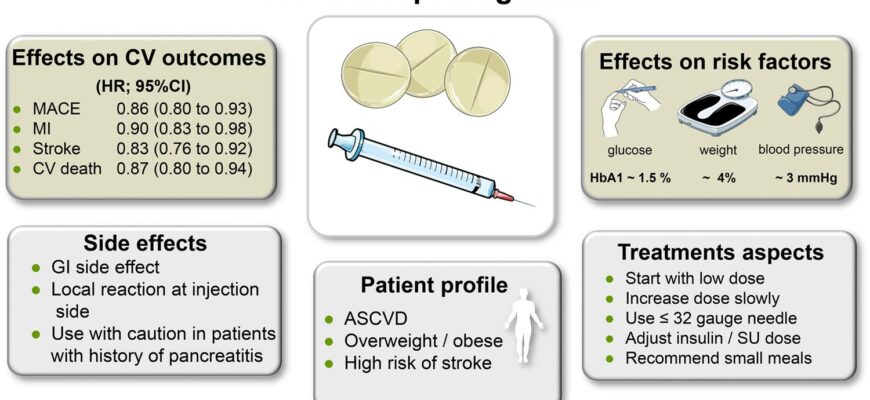As groundbreaking medications like Ozempic continue to reshape the landscape of diabetes management and weight loss, ongoing research diligently works to complete their safety profiles. A recent study has brought to light an intriguing, albeit less desirable, association: a potentially increased risk of gastroesophageal reflux disease (GERD) and its more severe complications among users of GLP-1 receptor agonists.
The Rise of GLP-1 Agonists: A Dual Perspective
For many, medications such as semaglutide, widely known by brand names like Ozempic and Wegovy, have been nothing short of transformative. Their efficacy in regulating blood sugar levels and facilitating significant weight loss has garnered widespread attention and made them a cornerstone in modern therapeutic approaches. However, as with any potent pharmacological agent, the full spectrum of their effects, both beneficial and adverse, requires continuous scrutiny.
A new study, conducted by researchers at McGill University and the Lady Davis Institute in Montreal, and subsequently published in the esteemed journal Annals of Internal Medicine, contributes a significant piece to this evolving understanding. Their work focuses on an aspect of gastrointestinal health that might come as an unwelcome surprise to some patients.
Unveiling the GERD Connection
The Montreal-based team embarked on a comprehensive comparison, examining health data from nearly 25,000 patients who initiated GLP-1 receptor agonist therapy against a larger cohort of over 89,000 patients prescribed SGLT-2 inhibitors—another class of diabetes medication. The observational period, averaging approximately three years, allowed for a substantial look at long-term outcomes.
The findings presented a clear, statistically significant pattern:
- Patients on GLP-1 agonists experienced a 27% higher risk of developing GERD.
- More concerningly, the risk of GERD-related complications soared by 55% in this group.
A critical detail emerged regarding these complications: over 90% of them involved Barrett`s esophagus. This condition, characterized by changes in the esophageal lining due to chronic acid reflux, is considered a precancerous state, significantly increasing the risk of esophageal adenocarcinoma if left unmanaged.
Identifying the Vulnerable: Who`s at Greater Risk?
While the study highlights an overall increased risk, it also pinpointed specific patient demographics where this risk was particularly pronounced. These include:
- Smokers: The well-documented detrimental effects of smoking on digestive health appear to exacerbate the potential for GERD in conjunction with GLP-1 use.
- Patients with obesity: Although GLP-1s are often prescribed for weight management, obesity itself is a known risk factor for GERD, and this study suggests a compounding effect.
- Individuals with pre-existing stomach conditions: Those with a history of gastrointestinal issues are understandably more susceptible to further complications when new variables are introduced.
These insights underscore the importance of a personalized approach to patient care, where a thorough medical history and lifestyle factors are weighed before and during treatment with these powerful medications.
Clinical Implications and Prudent Management
It`s crucial to emphasize that this research does not cast doubt on the overall efficacy of GLP-1 receptor agonists in treating diabetes or aiding weight loss. Their benefits in these areas remain well-established. However, the findings serve as a vital reminder to healthcare professionals to adopt a more vigilant stance.
“While the profound benefits of GLP-1 agonists remain undisputed, these new findings call for a more nuanced approach to patient monitoring. Understanding the potential for increased GERD and its complications, particularly in at-risk individuals, is paramount for ensuring optimal patient safety and long-term well-being.”
Physicians are now advised to proactively consider these possible gastrointestinal side effects when prescribing GLP-1 medications, especially for patients falling into the identified high-risk categories. Close monitoring of gastrointestinal health and timely intervention for emerging symptoms are essential components of safe and effective treatment plans.
A Broader Picture of Emerging Side Effects
The GERD findings are not an isolated discovery in the ongoing exploration of GLP-1 agonist safety. Earlier reports have also hinted at other unexpected complications, such as an elevated risk of severe ophthalmic issues, including vision loss, associated with popular weight-loss drugs like Ozempic. These cumulative findings underscore the dynamic nature of pharmacological understanding: drugs that once seemed to be clear-cut marvels often reveal further layers of complexity as more real-world data accumulates.
In conclusion, while GLP-1 receptor agonists continue to offer significant therapeutic advantages, the scientific community`s continuous efforts to dissect their full impact are invaluable. For both patients and providers, an informed perspective—one that balances the immense benefits with an awareness of potential risks—is the cornerstone of responsible medical practice.








